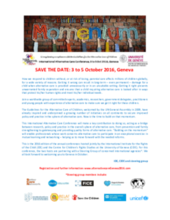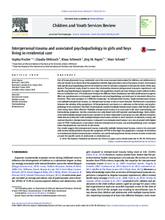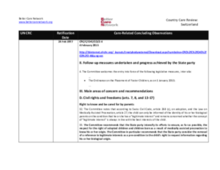Displaying 41 - 50 of 55
Université de Genève Centre for Children’s Rights Studies announces its Call for applications for the 2017-2018 cycle of the Certificate of Advanced Studies in Children’s Rights (CCR).
A summary of the International Alternative Care Conference 2016 via Storify.
"Building on the Momentum: International Alternative Care Conference" will take place 3-5 October 2016 in Geneva.
This position provides child protection technical leadership in the design and development of programs for children in countries in conflict, crisis, post-conflict and post-crisis settings across the world, with a specific focus on research, monitoring and evaluation for child protection.
This news report states that nearly half a million refugee and migrant children are in the hands of smugglers.
The present study aimed to assess the relationship between interpersonal traumatic experiences and specific psychopathological symptoms in a high-risk population of girls and boys living in youth welfare institutions in residential care.
The present study aimed to assess the relationship between interpersonal traumatic experiences and specific psychopathological symptoms in a high-risk population of girls and boys living in youth welfare institutions in residential care in Switzerland.
According to the article, Switzerland has opened its eighth “baby window,” a location where people can anonymously drop-off newborns, at a hospital in the city of Sion.
The 7th Milestones of a Global Campaign for Violence Prevention Meeting - hosted by the World Health Organization (WHO) at its Executive Boardroom in Geneva, Switzerland - will focus on child maltreatment and youth violence, among other topics.
This country care review includes the care-related Concluding Observations adopted by the Committee on the Rights of the Child as part of its examination of the fourth periodic reports of Switzerland (CRC/C/CHE /2-4).




